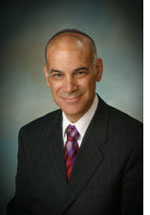By Rabbi Leonard Rosenthal

SAN DIEGO — Last Shabbat several congregants told me that they had expected me to speak about the unrest in Egypt during services. I did not because I believed it would be belaboring the obvious. However, since my rabbinic wisdom is being widely solicited, I will instead belabor the obvious here: the unrest in Egypt is not good for Israel!
Israel finds herself in the same moral/political bind as the United States. On one hand Israel and the U.S., as models of democracy, want to encourage democracy, freedom, and human rights throughout the world. On the other hand, President Hosni Mubarak, while acting as a virtual dictator and suppressing criticism, dissension, and opposition, has been a steadfast ally of the United States and maintained a cold peace with Israel.
The position of a new regime in Egypt toward the U.S. and Israel are an unknown. While Mubarak is friendly toward the U.S. and Israel, the Egyptian street is not as supportive, particularly when it comes to Israel. While Israelis have traveled and vacationed in Egypt, few Egyptians come to Israel. There are also regular public protests against Israel and criticism in the media as well. The democratization of Egypt might lead to the election of agovernment that would abrogate the thirty-year-old peace treaty negotiated by Prime Minister Menachem Begin, President Anwar Sadat, and U.S. President Jimmy Carter.
Furthermore, as of today there is no clear consensus of whom the leaders of a new Egypt might be. While Egypt today has a fundamentally secular government and most Egyptians are secular, the Muslim Brotherhood now is participating wholeheartedly in the revolt. The concern is that in the leadership vacuum that will be created if/when President Mubarak leaves office, the Muslim Brotherhood will step in and try to impose its version of Islamic law on the population. While its leadership denies that this is its intent, we have good reason to be concerned given the rise of the mullahs in Iran and the Taliban in Pakistan.
Given the tightrope that must be walked between the current regime and democracy, President Obama and Prime Minister Benjamin Netanyahu are both being very careful and cautious with their public pronouncements. On one hand, they do not want to suppress a genuinely democratic movement in Egypt but on the other, they do not want to antagonize Mubarak if he does remain in power.
An interesting observation about the current protests in Egypt and other Arab countries was made last week by David Suissa in a column on JewishJournal.com:
“They all warned us….For decades now, they have been warning us that if you want ‘peace in the Middle East,’ just fix the Palestinian problem. A recent variation on this theme has been: Just get the Jews in the West Bank and East Jerusalem to ‘freeze’ their construction, and then, finally, Palestinian leaders might come to the table and peace might break out.
And what would happen if peace would break out between Jews and Palestinians? Would all those furious Arabs now demonstrating on the streets of Cairo and across the Middle East feel any better? Would they feel less oppressed?”
“Has there ever been a greater abuse of the English language in international diplomacy than calling the Israeli-Palestinian conflict the ‘Middle East peace process?’ As if there were only two countries in the Middle East.
“Even if you absolutely believe in the imperative of creating a Palestinian state, you can’t tell me that the single-minded and global obsession with the Israeli-Palestinian conflict at the expense of the enormous ills in the rest of the Middle East hasn’t been idiotic, if not criminally negligent.”
Suissa is right. The ills and problems within the Arab world are too numerous and complex to blame on the Israeli-Palestinian conflict alone. The creation of a Palestinian state, though imperative, will not solve the poverty and suppression of human rights rampant throughout the Middle East.
What can we do in the current situation? The same as the U.S. and Israeli governments: just wait and see.
*
Rabbi Rosenthal is spiritual leader of Tifereth Israel Synagogue in San Diego